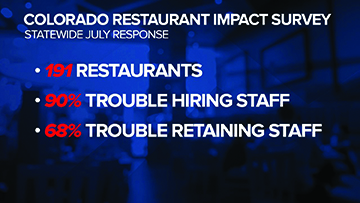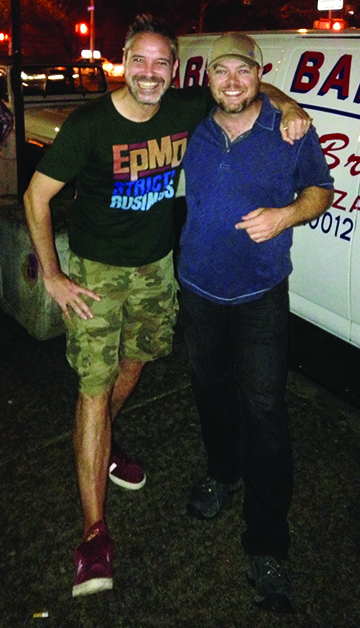If anything is good for pounding humility into you permanently, it’s the restaurant business. — Anthony Bourdain
By the end of 2019, the Mile High City’s hospitality industry was humming at a fever pitch. The slave-wage, cutthroat, desperation-driven, mercenary mindset which has driven this profession for decades was charging forth at full steam. This pulsating, sweat-drenched beast, however, was unaware that it was about to splat face down onto the floor like a piping hot pizza that was dropped by an underpaid line cook who showed up to work sick.

Research by the Colorado Restaurant Association shows restaurant worker employment numbers are below pre-pandemic levels. Colorado Restaurant Association image
By late March of 2020, the industry was being systematically gutted by circumstance. In the span of several very long months, many once-coveted, hard-to-land FOH (front of the house) and BOH (back of the house) positions had become vacant and were up for grabs. The “Great Reopening” had revealed a vacuum in the workforce. Much of the previous labor pool, while locked down and on unemployment, have seemingly discovered other options — perhaps pursuits offering better compensation, lower stress and even (gasp) employee benefits.
Surf’s Down
 In May of this year, at the onset of patio season, the Colorado Restaurant Association reported that nine out of 10 restaurants were having trouble hiring. Meanwhile, the Bureau of Labor Statistics recently reported that between February of 2020 and June of 2021, a restaurant labor pool of 234,500 had recovered to a mere 223,600 — nearly 11,000 workers lower than the previous tally. This begs the question, “Where did they all go?”
In May of this year, at the onset of patio season, the Colorado Restaurant Association reported that nine out of 10 restaurants were having trouble hiring. Meanwhile, the Bureau of Labor Statistics recently reported that between February of 2020 and June of 2021, a restaurant labor pool of 234,500 had recovered to a mere 223,600 — nearly 11,000 workers lower than the previous tally. This begs the question, “Where did they all go?”
In some instances, highly valued, seasoned professionals with years of FOH and/or BOH experience have pivoted and moved onto other pursuits. For example, 14-year Denver industry worker Nolan Ackerman (Southside, Goosetown Tavern) says, “I used the pandemic to finish my bachelor’s and get an internship. I’m out, for now.”
Meanwhile across town, Denver industry veterans and wife/husband team Casey Keller and Roy Benoit have pivoted inward, courageously becoming restaurant owners in late summer of 2020 (Wendell’s, 3838 Tennyson St.) Thus far, attracting qualified help has been somewhat of a challenge, “Overall volume and quality of applicants has been… discouraging,” Benoit explains. When asked about where the talent pool of qualified workers has gone, Benoit has a revealing perspective. “I feel that a lot of previously full-time industry folks often have skills or education that makes them marketable in other fields… and the last year has given many of those people the opportunity and/or impetus to pursue those things,” he begins. “There are certainly some people still collecting unemployment; we’ve physically seen this in people scheduling or coming to interviews for the admitted sole purpose of required work searches. I will say, I feel more of those lingering on unemployment may not be industry ‘professionals,’ if you will, but rather newer or shorter-term industry workers.”
Rather than spend time waiting for external circumstances to improve, however, Keller and Benoit have curated their own strategy for cultivating and maintaining a solid crew. “We believe in paying our people well to begin with and ascribe to quality over quantity when it comes to staffing,” Benoit says. “We currently have a very talented and dedicated staff and have done our best to compensate them accordingly. Now, it is possible we’re shorting ourselves some applicants by not openly advertising above industry norm pay, but even with the current pool, we’d prefer to be choosy and give ourselves the opportunity to pay quality staff what they’re worth and continue to do so.”
On the front lines across Denver, newer industry recruits are having to shoulder heroic workloads as people are coming out in droves to rekindle the beloved American pastime of “going out.” Crews of veritable “newbies” are facing hordes of guests in the FOH and torrents of orders in the BOH that would give the most hardened of veterans the heebie jeebies. In some instances, in order to avoid staff burnout, some establishments are having to cut their hours of operation or to simply remain closed on certain days.
Not Always The Case
Other establishments such as the beloved Bull & Bush on Cherry Creek Dr. have managed to circumvent the labor shortage. Bar-tender Dave Hummel explains the company policy of starting FOH personnel as hosts/hostesses and requiring them to work their way into the higher paying positions of waiting tables and tending bar. This may explain their FOH employee retention rate — even amid the current climate. “The only [labor] shortage we are really having is in the BOH,” he says. Restaurant co-owner David Peterson (with brother Erik) confirms this, saying, “There were a bunch of people chomping at the bit to get back to work. There were a few who opted to stay away and collect unemployment. But, for the most part, we managed to keep most of our staff.” Peterson goes on to explain with a rare tone of optimism, “We have been so busy, unbelievably so, we are breaking record sales.”
This new climate, however, has given rise to a novel phenomenon previously unheard of by most restaurateurs — even a lifelong professional like David Peterson. Recently, an employee of his kitchen staff lobbied for a raise by saying that he could simply go to another restaurant in Cherry Creek and get paid $20 an hour to do far less work because the place would be half as busy. Peterson was unfazed, however, explaining, “Yeah, I get where the guy was coming from. But what he doesn’t realize is that if the place is slow, they might give you the same amount of money, but they are going to cut your hours.”

Bar Car retains a core staff through superior treatment of employees in a preferred establishment in which to work. Jeremy Matzke image
Just across Colorado Boulevard to the North, another long-cherished mainstay establishment has a similar story. Bar Car is a one-of-a-kind blink-and-you’ll-miss-it type of place. Owner Jeremy Matzke believes their company policies helped them deflect the post-shutdown woes. “Speaking strictly from a small, well established locally owned bar, our reputation has held strong, [as] we are a desired place to work,” He begins. “We firmly believe in treating our employees as humans with opinions and feelings and make extra efforts to treat our employees with grace and [as] part of our family … we feel this philosophy is much stronger than most incentives.”
A Nationwide Phenomenon

Former Denver bartender-turned NYC drink slinger Donald Murphy, left, believes the service industry labor shortage is a nationwide problem. Donald Murphy photo
Shifting focus to the nation as a whole, it is becoming clear this is not just a Denver phenomenon — but something possibly taking place from coast to coast. Former Denver bartender Donald Murphy aka “Murph” (Splinters from the Pine, Pasquini’s Uptown) now works as senior drink-slinger and art curator at Upper East Side Manhattan’s esteemed Merrion Square. “This is a nationwide problem,” he attests. “All of the career people who had time off during Covid decided to collect their UI benefits as though they were finally recouping the would-be tips from every time they got stiffed,” he begins. “A lot of people realized, with all that time off, they never really wanted these jobs in the first place. In order to thrive in this industry, you have to truly enjoy serving people, helping guests have a good time, and talking shit with strangers.” Murph goes on to explain that amid the political/presidential madhouse that began in 2016, working in the FOH is not nearly as fun because of a combative, general populace that is divided by social ideals like never before. Many people, when out in public, are either intentionally rude or overly sensitive. This might explain the unattractiveness of the service industry to many entry-level people. “Social division has made working in restaurants and bars not nearly as enjoyable,” he says.
Lopsided Demographics
Back in Denver, the labor shortage seems to be prevalent in some areas and nonexistent in others. For example, many businesses in the LoDo district, the Highlands and the RiNo district are short staffed while outliers in more suburban areas are not. This might also be explained by the average restaurant worker wage compared to the costs of living in these areas. After all, who wants to commute into a congested area, search for parking (if you even have a car), wait on people who live in the neighborhood and make more money than you (entitled a**holes), and then commute back home to your meager dwelling every day?
To combat this, restaurant owners, at least some, are adopting new business models with a variety of adaptations. Some feature higher hourly wages while others offer profit sharing for untipped workers and others are doing the unheard of by offering benefits to part-time, tipped employees. Yesterday’s service industry professionals who have moved on may catch wind of this and be taken aback in utter disbelief. Whether it brings them back into the fold, however, seems rather unlikely — but only time will tell.


